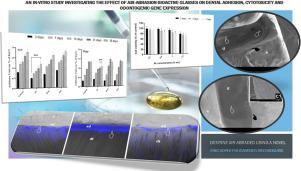Dental Materials ( IF 4.6 ) Pub Date : 2021-09-22 , DOI: 10.1016/j.dental.2021.09.004 Gianrico Spagnuolo 1 , Paula Maciel Pires 2 , Anna Calarco 3 , Gianfranco Peluso 3 , Avijit Banerjee 4 , Sandro Rengo 1 , Augusto R Elias Boneta 5 , Salvatore Sauro 6

|
Objective
To assess the microtensile bond strength (MTBS) and interfacial characteristics of universal adhesives applied on dentine air-abraded using different powders. The analysis includes the cytotoxicity of the powders and their effect on odontogenic gene expression.
Methods
Sound human dentine specimens were air-abraded using bioglass 45S5 (BAG), polycarboxylated zinc-doped bioglass (SEL), alumina (AL) and submitted to SEM analysis. Resin composite was bonded to air-abraded or smear layer-covered dentine (SML) using an experimental (EXP) or a commercial adhesive (ABU) in etch&rinse (ER) or self-etch (SE) modes. Specimens were stored in artificial saliva (AS) and subjected to MTBS testing after 24 h and 10 months. Interfacial nanoleakage assessment was accomplished using confocal microscopy. The cytotoxicity of the powders was assessed, also the total RNA was extracted and the expression of odontogenic genes was evaluated through RT-PCR.
Results
After prolonged AS storage, specimens in the control (SML) and AL groups showed a significant drop in MTBS (p > 0.05), with degradation evident within the bonding interface. Specimens in BAG or SEL air-abraded dentine groups showed no significant difference, with resin-dentine interfaces devoid of important degradation. The metabolic activity of pulp stem cells was not affected by the tested powders. SEL and BAG had no effect on the expression of odontoblast differentiation markers. However, AL particles interfered with the expression of the odontogenic markers.
Significance
The use of bioactive glass air-abrasion may prevent severe degradation at the resin-dentine interface. Unlike alumina, bioactive glasses do not interfere with the normal metabolic activity of pulp stem cells and their differentiation to odontoblasts.
中文翻译:

一项体外研究,研究空气磨损生物活性玻璃对牙齿粘连、细胞毒性和牙源性基因表达的影响
客观的
评估在使用不同粉末进行空气研磨的牙本质上应用的通用粘合剂的微拉伸粘合强度 (MTBS) 和界面特性。分析包括粉末的细胞毒性及其对牙源性基因表达的影响。
方法
使用生物玻璃 45S5 (BAG)、聚羧化锌掺杂生物玻璃 (SEL)、氧化铝 (AL) 对健全的人类牙本质标本进行空气研磨,并进行 SEM 分析。使用实验性 (EXP) 或商用粘合剂 (ABU) 以蚀刻和冲洗 (ER) 或自蚀刻 (SE) 模式将树脂复合材料粘合到空气研磨或涂抹层覆盖的牙本质 (SML)。样本储存在人工唾液 (AS) 中,并在 24 小时和 10 个月后进行 MTBS 测试。使用共聚焦显微镜完成界面纳米渗漏评估。评估了粉末的细胞毒性,还提取了总 RNA,并通过 RT-PCR 评估了牙源性基因的表达。
结果
在延长 AS 储存时间后,对照 (SML) 和 AL 组中的样品显示出 MTBS 显着下降 (p > 0.05),在粘合界面内降解明显。BAG 或 SEL 空气研磨牙本质组中的样本没有显着差异,树脂-牙本质界面没有明显的降解。牙髓干细胞的代谢活性不受测试粉末的影响。SEL 和 BAG 对成牙本质细胞分化标志物的表达没有影响。然而,AL 颗粒会干扰牙源性标记物的表达。
意义
使用生物活性玻璃空气研磨可以防止树脂-牙本质界面的严重降解。与氧化铝不同,生物活性玻璃不会干扰牙髓干细胞的正常代谢活动及其向成牙本质细胞的分化。











































 京公网安备 11010802027423号
京公网安备 11010802027423号